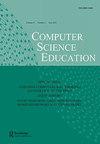计算机科学教师专业发展与专业学习共同体:研究文献综述
IF 2.2
Q1 EDUCATION & EDUCATIONAL RESEARCH
引用次数: 14
摘要
背景与背景许多努力都致力于通过提供专业发展(PD)计划来培养计算机科学(CS)教师的能力。以前的审查表明,需要为教师提供更多的持续支持。最近的研究已将重点转移到通过为计算机科学教师建立plc来扩大PD和维持教学能力。目的本研究旨在对K-12 CS教师PD的最新研究进行系统的文献综述,并对plc进行明确的探索。方法基于41个项目的48篇精选文章,本研究探讨了促进PD有效性的特征,包括:(1)PD目标,(2)理论框架和PD模型,(3)课程和教学法,(4)编程工具,(5)项目结构和方法,以及(6)PD评估。我们还研究了这些程序是否以及如何专门用于建立plc。研究结果表明,对CS教师PD的研究数量有相当大的增加。更多的项目看到了plc的前景,并探索了各种社区建设和促进教师学习的方法。plc对教师发展具有巨大的潜力,包括打破教师孤立和促进合作。更多的研究可以为CS教师的培养和发展提供启示。本文章由计算机程序翻译,如有差异,请以英文原文为准。
Computer science teacher professional development and professional learning communities: a review of the research literature
ABSTRACT Background & Context Many efforts have been dedicated to building computer science (CS) teacher capacity through offering professional development (PD) programs. Previous reviews indicated the need to offer more continual support for teachers. Recent research has shifted its focus to scaling up PD and sustaining teaching capacity by establishing PLCs for CS teachers. Objective This study aims to conduct a systematic literature review of recent research on K-12 CS teacher PD, with an explicit exploration of PLCs. Method Based on 48 selected articles of 41 programs, this study explored features that contributed to the effectiveness of PD, including (1) PD goals, (2) theoretical frameworks and PD models, (3) curriculum and pedagogy, (4) programming tools, (5) program structure and approach, and (6) PD evaluation. We also examined whether and how these programs were dedicated to establishing PLCs. Findings Findings indicate a considerable increase in the number of studies on CS teacher PD . More programs saw the promising roles of PLCs and explored a variety of approaches for community building and promoting teacher learning. Implications PLCs have immense potential for teacher development, including breaking teacher isolation and fostering collaboration. More research can enlighten the efforts for CS teacher preparation and development.
求助全文
通过发布文献求助,成功后即可免费获取论文全文。
去求助
来源期刊

Computer Science Education
EDUCATION & EDUCATIONAL RESEARCH-
CiteScore
6.90
自引率
3.70%
发文量
23
期刊介绍:
Computer Science Education publishes high-quality papers with a specific focus on teaching and learning within the computing discipline. The journal seeks novel contributions that are accessible and of interest to researchers and practitioners alike. We invite work with learners of all ages and across both classroom and out-of-classroom learning contexts.
 求助内容:
求助内容: 应助结果提醒方式:
应助结果提醒方式:


